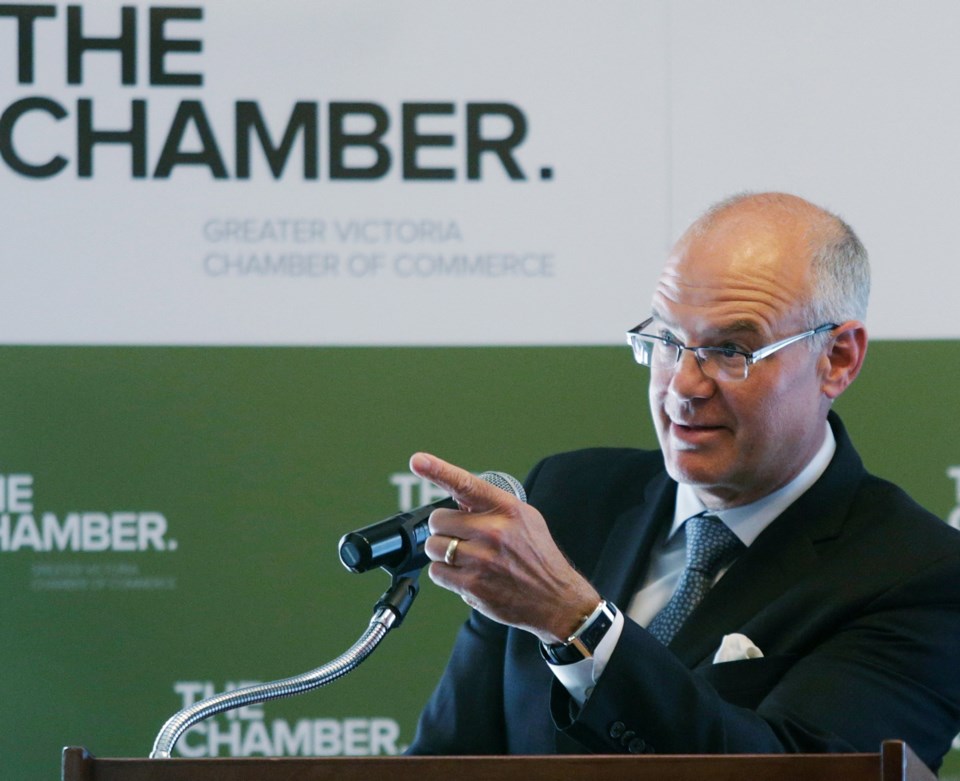Victoria’s downtown is in the midst of an economic upturn heading into 2014, says Mayor Dean Fortin.
“We have to recognize that in the last five years, and particularly the last couple, we have more cranes up than in 2006, which was the height of the building boom,” Fortin said in a year-end interview.
“We really have a continued renewal going on, particularly in the downtown.”
Fortin is particularly excited about a couple of major office projects still on the horizon.
One is a major development proposal from Victoria-based Jawl Properties, developer of downtown’s Atrium office building, for the block across Douglas Street from city hall. The development site includes the former Royal Bank and adjacent parking lot known as the Roth Site, located in the 700 block of Pandora Avenue.
The proposal has been submitted to city staff and is expected to be before city council soon.
“The redevelopment of that block has been long awaited and certainly will be exciting,” Fortin said.
The other major project relates to the province’s announced sale of almost an entire block in the James Bay legislative precinct for redevelopment as offices.
Colliers International is marketing the land, calling it Capital Park, with the hope of selling it by March 21.
The property falls under a master development agreement created in the early 1990s called the Victoria Accord, which allows for offices to be built.
The province is prepared to lease 180,000 square feet on a 20-year term.
“That is just a good signal that everyone has been waiting for,” Fortin said. “That’s exciting — the commitment from the province, the fact that we’re going to get revenue and amenities. Those are important for the city.”
Fortin cites green initiatives such as the new rush-hour bus lanes to be painted on Douglas Street beginning in January, renewal of some parks such as at Fishermen’s Wharf, the launch of a cycling task force and the kitchen scrap diversion program as highlights of the recent term.
“It’s just paint [for the bus lanes], but it signals a large step forward on where we want to go in transportation and public transportation — strengthening both the core and the outlying areas in quality of life and how we address both quality of life in terms of how fast your get downtown and environmental issues,” he said.
Victoria enters 2014 with a new police chief but without a new agreement in place to police Esquimalt.
Since the forced merger of the Esquimalt and Victoria police forces 10 years ago, Esquimalt has complained about rising costs, slow response times and poor service by Victoria police.
A decision by Esquimalt to go with the RCMP was overturned by the province, but a new deal setting out the terms of service is yet to be reached.
Fortin said he is hopeful a new deal will be reached soon.
With the replacement of the Johnson Street Bridge — the largest capital project in the city’s history — well underway, the city still has some major infrastructure decisions to make.
The aging Crystal Pool is on its last legs, with repairs estimated at $6 million and replacement at up to $58 million; the Point Ellice Bridge is in need of $11 million in repairs; and Victoria’s Fire Station No. 1 is in need of major upgrade or replacement at a cost ranging from $8 million to $18 million.
Council has asked for more detailed reports on the projects before engaging the public on preferred options. Fortin expects the bridge upgrades will be funded through gas-tax revenues.
Council has set a ceiling on property tax increases of 3.25 per cent for each of the three years of this term. Fortin said it is important to note that 1.25 per cent of that increase is dedicated to building infrastructure reserves and that, by 2017, the city will have sufficient reserves to maintain existing infrastructure.
Fortin said he understands people who find Victoria an expensive place to live, but said budgeting can’t be about “cutting everything” and is more about finding a balance.
“Even in times of austerity, there are important things that need to be done. It isn’t about cutting everything and not providing an adequate level of services. You recognize what’s important; protect those, perhaps enhance those and then look for reductions in other areas,” he said.
The coming year will bring a municipal election — one in which Fortin plans to stand for re-election.
He predicts economic development, taxation and the environment will be the main election issues.
The past two years have brought some marathon council and committee meetings as the eclectic group that makes up Victoria council seems to enjoy debate.
“That’s healthy,” he said. “That’s what the residents have given us to work with. We may not make decisions as fast as possible and we may not make them with a lot of unanimity, but we certainly chew every issue to make sure every side is seen.”



